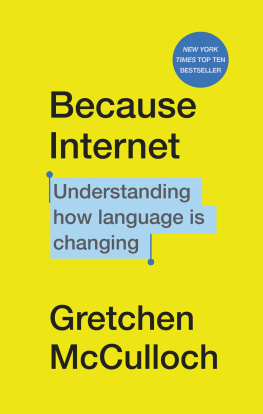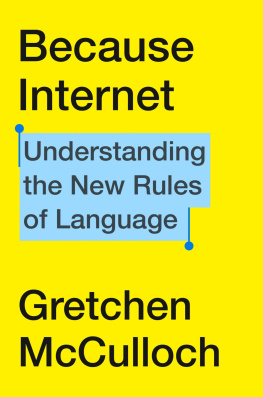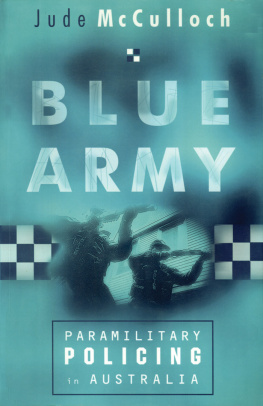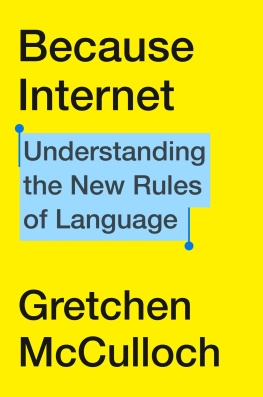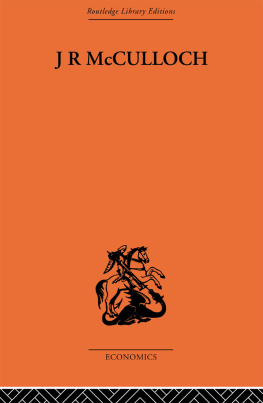McCulloch - Because Internet
Here you can read online McCulloch - Because Internet full text of the book (entire story) in english for free. Download pdf and epub, get meaning, cover and reviews about this ebook. year: 2019, publisher: Random House, genre: Politics. Description of the work, (preface) as well as reviews are available. Best literature library LitArk.com created for fans of good reading and offers a wide selection of genres:
Romance novel
Science fiction
Adventure
Detective
Science
History
Home and family
Prose
Art
Politics
Computer
Non-fiction
Religion
Business
Children
Humor
Choose a favorite category and find really read worthwhile books. Enjoy immersion in the world of imagination, feel the emotions of the characters or learn something new for yourself, make an fascinating discovery.
Because Internet: summary, description and annotation
We offer to read an annotation, description, summary or preface (depends on what the author of the book "Because Internet" wrote himself). If you haven't found the necessary information about the book — write in the comments, we will try to find it.
Because Internet — read online for free the complete book (whole text) full work
Below is the text of the book, divided by pages. System saving the place of the last page read, allows you to conveniently read the book "Because Internet" online for free, without having to search again every time where you left off. Put a bookmark, and you can go to the page where you finished reading at any time.
Font size:
Interval:
Bookmark:


Gretchen McCulloch writes about linguistics for a general audience, especially internet language. She writes the Resident Linguist column at Wired. McCulloch has a masters in linguistics from McGill University, runs the blog All Things Linguistic, and cohosts the Lingthusiasm podcast. She lives in Montreal, but also on the internet.
To the people who make internet language. You are the territory, this is merely a map.
Imagine learning to talk from recordings rather than people. If you learned how to have a conversation from movies, you might think that people regularly hang up the phone without saying goodbye and no one ever interrupts anyone else. If you learned to think out loud from news programs, you might believe that no one ever ums or waves their hands while searching for an idea, and that people swear rarely and never before ten p.m. If you learned to tell stories from audiobooks, you might think that nothing much new had happened with the English language in the past couple hundred years. If you only ever talked when you were public speaking, youd expect that talking always involves anxious butterflies in your stomach and hours of preparation before facing an audience.
Of course, you did none of these things. You learned to speak English domestically, conversationally, and informally long before you could sit through an entire news report or deliver a speech. You might never be wholly comfortable with public speaking, but of course you can complain about the weather to a friend. Sure, they both involve moving the same body parts, but theyre hardly the same task at all.
And yet this is exactly how we all learned to read and write.
When we think about writing, we think about books and newspapers, magazines and academic articlesand the school essays in which we tried (and mostly failed) to emulate them. We learned to read a formal kind of language which pretends that the past century or two of English hasnt really happened, which presents words and books to us cut off from the living people who created them, which downplays the alchemy of two people tossing thoughts back and forth in perfect balance. We learned to write with a paralyzing fear of red ink and were taught to worry about form before we even got to consider what we wanted to say, as if good writing were a thing of mechanistic rule-picking rather than of grace and verve. Naturally, were as intimidated by the blank page as we are by public speaking.
That is, we were until very recently. The internet and mobile devices have brought us an explosion of writing by normal people. Writing has become a vital, conversational part of our ordinary lives. In the year 800, Charlemagne managed to get himself crowned as Holy Roman Emperor without being able to sign his own name. Sure, he had scribes to write up his charters, but illiterately running an empire? Today its hard to imagine even organizing a birthday party without writing. One type of writing hasnt replaced the other: the Happy Birthday text message hasnt killed the diplomatic treaty. Whats changed is that writing now comes in both formal and informal versions, just as speaking has for so long.
We write all the time now, and most of what were writing is informal: our texts and chats and posts are quick, theyre conversational, theyre untouched by the hands of an editor. If you define a published writer as someone whos had something theyve written reach over a hundred people, practically everyone who uses social media qualifiesjust make an announcement post about a new job or a new baby. Its not that edited, formal writing has disappeared online (there are plenty of business and news sites that still write much like we did in print), its that its now surrounded by a vast sea of unedited, unfiltered words that once might have only been spoken.
Im a linguist, and I live on the internet. When I see the boundless creativity of internet language flowing past me online, I cant help but want to understand how it works. Why did emoji become so popular so quickly? Whats the deal with how people of different ages punctuate their emails and text messages so differently? Why does the language in memes often look so wonderfully strange?
Im not alone in wondering about these things. When I started writing about internet linguistics online, I quickly ran into more follow-up questions from readers than just another article could answer. I went to conferences and dived into research papers and ran a few of my own queries. I realized that in many cases there were answers, just not from an internet native speaker, not all together in one place, not in a form thats fun to read regardless of how much you already know about linguistics. So I wrote this book.
Linguists are interested in the subconscious patterns behind the language we produce every day. But traditionally, linguistics doesnt analyze writing very much, unless its a question about the history of a language and written records are all we have. The problem is that writing is too premeditated, too likely to have gotten filtered through multiple hands, too hard to attribute to a single persons linguistic intuitions at a specific moment. But internet writing is different. Its unedited, its unfiltered, and its so beautifully mundane. And, as Ive continued rediscovering with every chapter of this book, when we analyze the hidden patterns of written internet language, we can understand more about our language in general.
Internet writing is also useful because speech is an absolute nightmare to analyze. First of all, speech vanishes as soon as its said, and if youre just taking notes, you might be misremembering things or not noticing everything. So you want to record the audio, but thats your second problem: now you need to physically transport people into a recording lab or travel around with a recorder. Once youve got recordings, youve got a third problem: processing. It takes about an hour of skilled human work per minute of audio recording to get speech into a transcript usable for linguistic analysis: to transcribe the overall gist, to go back and add detailed phonetic information, to extract parts and analyze their acoustic frequencies or sentence structure. Many a beleaguered linguistics grad student has spent years of their life doing precisely this, in search of the answers to just a handful of specific questions. Its hard to do at a massive scale. All the while, theres a fourth challenge: your participants probably wont talk to an academic interviewer the same way theyd talk to a friend. Want to analyze a signed language instead? Instead of analyzing audio in just one dimension, now youre facing video in two. Want to skip a step and use preexisting recordings? Good luck: most of that is news, acting, and other formal varieties.
There were difficulties in studying informal writing before the internet, too. It existed, in forms like letters, diaries, and postcards, but by the time a collection of papers is donated to an archive, theyve generally been moldering in boxes for decades, and of course they also need to be processed in order to be analyzed. Deciphering old-timey handwriting on fragile paper is only marginally easier than transcribing audio. Studies of Victorian letters and medieval manuscripts can tell us that a particular word is older than we thought, or provide evidence of changing pronunciations through idiosyncratic spelling, but we dont want to limit our studies of present-day English to a fifty-year time delay, based solely on the highly biased sample of the kinds of famous people whose papers get donated to archives. But if we wanted more recent stuff, wed again face the logistical challenges of getting people to write, for instance, sample postcards for our study and hoping that theyre not too self-conscious about researchers reading their words.
Next pageFont size:
Interval:
Bookmark:
Similar books «Because Internet»
Look at similar books to Because Internet. We have selected literature similar in name and meaning in the hope of providing readers with more options to find new, interesting, not yet read works.
Discussion, reviews of the book Because Internet and just readers' own opinions. Leave your comments, write what you think about the work, its meaning or the main characters. Specify what exactly you liked and what you didn't like, and why you think so.

